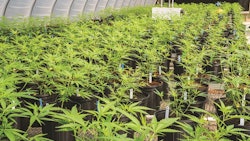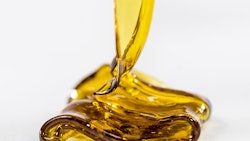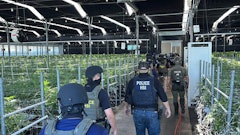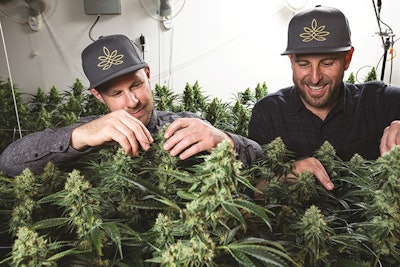
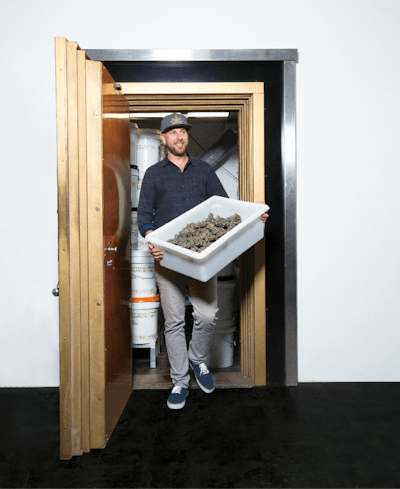
With one eye toward the surf visible through his Santa Cruz apartment’s bathroom window and the other on his spare-bedroom grow, life was pretty simple for Daniel Wacks 15 years ago. “I got a lot of surf breaks, got a lot of smoke breaks—and I would plant, harvest, vacation, repeat. My only professional ambitions were to one day have a warehouse full of weed,” Wacks recalls.
With those warehouse ambitions satisfied nearly 10 years ago, State Flower Cannabis has morphed into something bigger than those early dreams and launched Wacks on the wild, wonderful ride of being State Flower’s CEO today.
Auspicious Beginnings and Evolution
State Flower’s story starts with humble beginnings and fortuitous partnerships. Wacks and his business partner, Jeremy Cohen, now State Flower’s chief operating officer (COO), attended college together at UC-Santa Cruz. “I literally bought my first ounce of weed from him freshman year,” Wacks says, with a laugh. That was 1999.
After college, a mutual friend started managing the local hydroponics store, which eventually grew into a chain: The GrowBiz. That mutual friend taught Wacks, by then a medical cannabis patient, the hydroponic techniques he learned from GrowBiz’s owner, and Wacks’ first grow soon followed.
Wacks started growing 15 years ago as a home grower under Prop 215 (California’s Compassionate Use Act of 1996). Within a few years of his start, the partners set up a grow at Cohen’s Oakland, Calif., home. 2010 marked their first large-scale grow, in an 8,000-square-foot Silicon Valley-area warehouse, and the team partnered with Santa Cruz’s first dispensary, Santa Cruz Patients Collective.
In 2011, State Flower started growing for The Apothecarium’s newly opened, original San Francisco dispensary. That led to a 2014 partnership and a vertically integrated Nevada business comprised of State Flower Las Vegas (which operates a state-of-the-art, 40,000-square-foot cultivation facility off the Vegas strip), the Apothecarium Las Vegas, plus Kiva Confections Nevada, and Valhalla Confections Nevada.
Shortly thereafter, State Flower’s California headquarters moved to a 20,000-square-foot San Francisco cultivation and distribution facility. Currently at about 25-percent capacity, the facility is expanding to full capacity as this issue goes to press, bringing State Flower’s total cultivation footprint to nearly 60,000 square feet—a long way from that Santa Cruz bedroom.
Hydro Heritage and Data-Driven Cultivation
Early exposure to indoor hydroponics set the course for Wacks and all State Flower grows. “Hydroponic was the first technique I learned, and it was successful from the beginning. ... I can appreciate soil grows and all other mediums, but the science that really brought us in this direction is that plants obtain carbon, hydrogen and oxygen from the air and water. However, other nutrients are necessary for plant growth as well. When mineral nutrients are added during the entire lifespan of the plants, they really help ensure healthy growth,” Wacks says.
State Flower’s cultivation process incorporates Grodan-brand rockwool and crop-sensing technology/analytic equipment that Wacks says “has allowed us insight and control over our crops like we’ve never had before. Monitoring and managing the root zone to this level of detail has really elevated our flowers and our productivity to another level.”
With real-time crop data from the sensor technology, including information on water content, electrical conductivity and root temperature, State Flower’s approach to cultivation has been transformed. “Optimizing our irrigation strategy with real-time data has improved our decision-making capacity remotely and in the field,” Wacks explains. “Maximizing production capacity while lowering COGS [costs of goods sold] is the name of the game, and this tool has increased our production capacity by 25 percent while reducing our input cost by nearly 50 percent.”
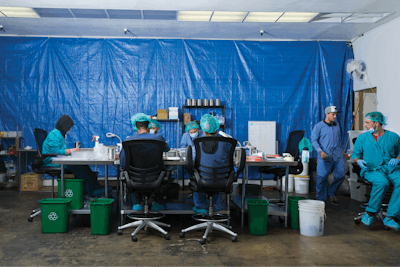
Scaling Small-Batch, Boutique Ideals
State Flower Cannabis built its reputation in part on exceptional boutique cannabis produced in batches of 5 pounds or less. With current expansion, production will hit a larger scale and batches will be slightly larger, but the team’s commitment to small-batch ideals won’t change. “Our scale, by present-day standards, is still essentially a boutique scale,” Wacks says.
State Flower’s average cultivation yield is 57 grams per square foot of canopy, says Wacks. He estimates that full expansion at the San Francisco facility will yield a little more than 4,000 pounds per year. Estimated full-expansion yields for the Las Vegas facility run about 11,000 pounds annually, he says.
One of the main motivations behind the company’s small-batch production is its commitment to variety. State Flower traditionally has 10 to 12 strains in production. At full production, Wacks expects that will increase to 20 to 25.
“Growing small batches incurs much higher testing costs now in California. So even with testing costs essentially quadrupling in California, we’re really still committed to maintaining a wide offering of cultivars,” Wacks shares. “A lot of cultivations have had to consolidate their offerings as a result of those increased costs. But focusing on small-batch cannabis really allows us to focus on quality over quantity and keeps folks happy who’ve grown to love some of our classic offerings.”
In California, State Flower’s most popular strains are its Lambsbread (classic Jamaican landrace) and its Wedding Cake, bred by Seed Junky Genetics. In Nevada, top strains are Granddaddy Purple (GDP) and Cherry AK.
Wacks has strong opinions about strain names—and he says State Flower makes a point to give credit to breeders behind the strains and maintain the legacy of classic names. “Breeding is an incredibly cumbersome process. We do our best to give credit to the breeders who do the work,” Wacks says. “Some companies tend to want to change the names of well-known breeders’ work to things like ‘Calm,’ and, quite frankly, it’s just a slap in the face to not only the craft, but to the cultural heritage and the traditions that make California the cannabis epicenter.”
While Wacks acknowledges that some names can be confusing to consumers, he notes that it’s part of learning about the craft, much like wine enthusiasts learning various varietals. “A big winemaker changing the name of a classic varietal would be seen as culturally inept and even insulting to some—at least in the upmarket end of the spectrum,” he says. “It also indicates a tipping point where brands are being developed for the purpose of being acquired, rather than preserving their legacy as California growers.”
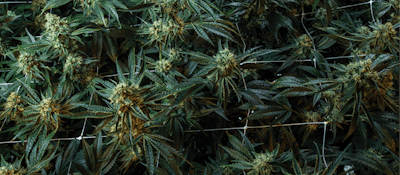
Automation that Augments Quality
The State Flower team readily incorporates tools from commercial agriculture, so long as it suits their small-batch, boutique goals. If automating a process preserves the quality and makes sense economically, then they do it. If it doesn’t, then they don’t.
One process State Flower hopes to automate further is its nutrient-delivery system. “Our fertigation equipment is really key to not just creating a more economical process without sacrificing any quality, but in fact really dialing that process in and eliminating the potential for any human error,” Wacks explains.
That said, he’s clear that State Flower is not about replacing people. “I still absolutely need great growers who know how to grow and aren’t just depending on their technology, but are really adapting that practice from commercial ag and still maintaining the amount of inputs we use to really optimize cannabis versus other commercial ag crops.”
That perspective extends to the trim room, where all trimming is performed by hand. The trim room is also where all State Flower employees get their start.
“By developing an understanding of what the finished product should look like, they can work their way backwards through the cultivation process with a focus on optimizing the results of their work,” Wacks says.
“I started in the trim room. Jeremy started in the trim room. That’s how we learned, and it’s been super helpful for us. It’s a technique we’ve applied to everyone, regardless of their background,” Wacks says.
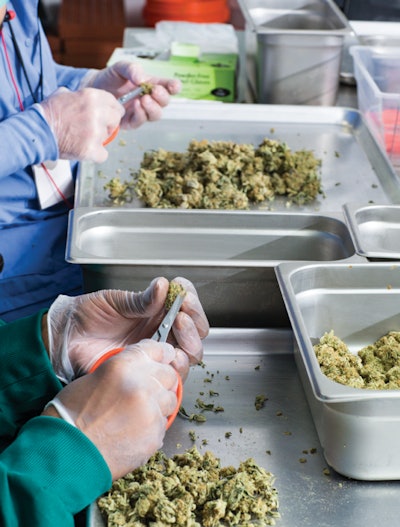
Conservation, Sustainability and Certification
State Flower’s cultivation strategies include a focus on sustainability and pure, clean flowers. “Conserving water is a huge part of why we grow hydroponically, too. Typically, hydroponics consume roughly 10 percent of what an equivalent field crop would consume,” Wacks says.
“The analytic equipment has been key, again, to help us really dial in our water content within the grow medium so we don’t have unnecessary runoff. There’s almost no waste in our facility,” he shares. The team also collects and reuses all the condensate runoff from their HVAC equipment.
State Flower’s Envirocann certifications in both California and Nevada underscore its commitment to offering synthetic-pesticide-free products. Envirocann’s third-party, non-governmental cannabis certification focuses on quality assurance and quality control at all stages of the crop. (The organization’s EnvirOganic certification applies only to soil grows, while soilless grows pursue Envirocann certification.)
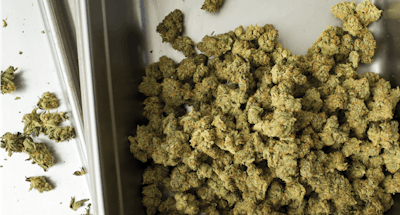
“Envirocann really enables us to prove to consumers that we’ve gone above and beyond government regulations to produce the cleanest product available,” Wacks explains. “They test every stage of growth, not just the finished product, which is a state-mandated regulation. Envirocann comes in and tests and does surprise inspections of every stage, from clones all the way through finished flower.”
As Wacks points out, the impact of certifications like Envirocann vary by state. “California has gone above and beyond with pesticide regulations. Whereas in Nevada, there are still really toxic products that folks are allowed to use, and you just need to test under a certain threshold.” For example, Nevada allows products to test for up to 4 ppm of myclobutanil (commonly sold as Eagle 20), a fungicide banned for use on cannabis in most states.
“[Certification] is a lot more essential in a state like Nevada—at least for us, as a company that has a process that’s completely free of synthetic pesticides,” he says.
Challenges, Changes and Competitive Advantage
Overall, State Flower has adjusted well to California’s new regulatory environment, thanks in part to its Nevada experience. “Nevada is generally considered to be one of the most strictly regulated states industry-wide, so we learned to really adapt and overcome,” Wacks says. He adds that Nevada has the strictest guidelines on microbial testing and a more vigorous vetting and auditing process than most states.
“Generally, I think the [California] regulators have done a magnificent job. A lot of people were really predicting a doomsday scenario, and it has not been that,” Wacks says. “Yes, there’s a supply shortage. There was one in Nevada as well. But I think that will stabilize fairly soon. That’s when marketing and all the other things that make a well-rounded company in other spaces are going to really be essential as well.”
Many operators have had difficulty adapting, but Wacks feels that isn’t necessarily the state’s fault. “I think some of the best growers in California have unfortunately lacked some of the resources, some of the sophistication, to adapt to their modern-day reality,” he says.
“Other states have gotten ahead of us with regards to figuring out how to make the regulations work, and operators in other states have figured out how to operate in a regulated environment ahead of us. ... Nevada has had a strict regulatory framework fully implemented since mid-2015, three years ahead of California.
“Nevada was hugely helpful in helping us adapt. We were on the shelves July 1 [2017]. We were on the shelves Jan. 1 [in California]. So, I’m really proud of our team for dealing with some pretty difficult circumstances,” Wacks says.
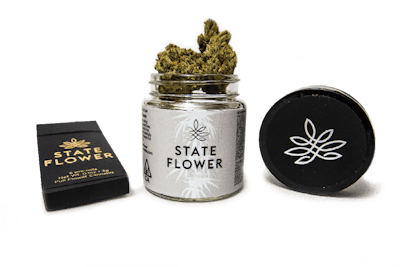
Compassion, Gratitude and Open Arms
Wacks freely expresses his compassion toward cultivators who’ve had a tough go with changes, as well as his gratitude for being one of the lucky few who have an opportunity to participate in today’s industry. “I feel very fortunate. I’m a pretty normal guy … and things started out very simple. They’ve gotten certainly a lot more complex, but I’m very thankful to be where I’m at right now,” he says.
With that in mind, he floats the following message out to the industry. “We have all—at least cultivators that have been doing this for a long time—had pretty humble beginnings. We’ve been very fortunate, … and we’ve lost a lot of growers to legal issues. There’s some incredibly talented, previously incarcerated operators out there that we shouldn’t turn our backs on,” he says.
“There’s been a lot of pushback from the industry on equity programs and, for me, that’s pretty hypocritical for folks who have been lucky enough, like myself, to successfully navigate the gray area in California, prior to 2018,” Wacks says. “I think it’s really important that the industry embraces its roots and a rising tide should lift up all ships.”
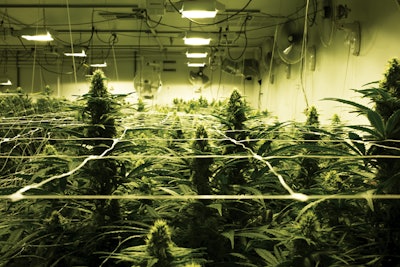
State Flower doesn’t just talk the talk: It’s the only cannabis cultivation business that is a member of SFMade, a nonprofit that helps sustain and create job opportunities for the city’s low-income communities, and is also involved in local politics by supporting Shamann Walton, a candidate for San Francisco’s Board of Supervisors, who Wacks expects will play a critical role in helping to create a model equity program in San Francisco.
“As we expand, we will be working with Shamann’s organization, Young Community Developers, to hire previously incarcerated victims of the failed war on drugs and develop cannabis training programs that benefit our community—the Bayview neighborhood in San Francisco—and benefit the industry as a whole by showing how cannabis businesses can help create opportunity-rich communities that enable low-income people and communities of color to thrive.”
And as far as what’s replaced his early warehouse-of-weed ambitions? Wacks says: “Our plans for State Flower are to build a national brand and to not lose our identity in the process.”










